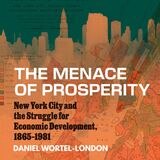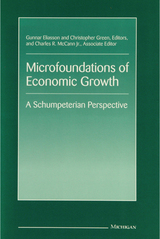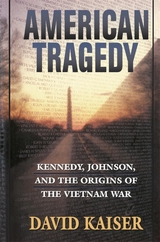
Fought as fiercely by politicians and the public as by troops in Southeast Asia, the Vietnam War--its origins, its conduct, its consequences--is still being contested. In what will become the classic account, based on newly opened archival sources, David Kaiser rewrites what we know about this conflict. Reviving and expanding a venerable tradition of political, diplomatic, and military history, he shows not only why we entered the war, but also why our efforts were doomed to fail.
American Tragedy is the first book to draw on complete official documentation to tell the full story of how we became involved in Vietnam--and the story it tells decisively challenges widely held assumptions about the roles of Eisenhower, Kennedy, and Johnson. Using an enormous range of source materials from these administrations, Kaiser shows how the policies that led to the war were developed during Eisenhower's tenure and nearly implemented in the closing days of his administration in response to a crisis in Laos; how Kennedy immediately reversed course on Laos and refused for three years to follow recommendations for military action in Southeast Asia; and how Eisenhower's policies reemerged in the military intervention mounted by the Johnson administration. As he places these findings in the context of the Cold War and broader American objectives, Kaiser offers the best analysis to date of the actual beginnings of the war in Vietnam, the impact of the American advisory mission from 1962 through 1965, and the initial strategy of General Westmoreland.
A deft re-creation of the deliberations, actions, and deceptions that brought two decades of post-World War II confidence to an ignominious end, American Tragedy offers unparalleled insight into the Vietnam War at home and abroad--and into American foreign policy in the 1960s.
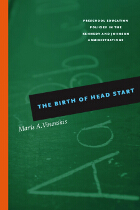
Policymakers proposing to reform Head Start often invoke its origins to justify their position, but until now no comprehensive political history of the program has existed. Maris A. Vinovskis here provides an in-depth look at the nation's largest and best known—yet politically challenged—early education program. The Birth of Head Start sets the record straight on the program's intended aims, documenting key decisions made during its formative years. While previous accounts of Head Start have neglected the contributions of important participants such as federal education officials and members of Congress, Vinovskis's history is the first to consider the relationship between politics and policymaking and how this interaction has shaped the program. This thorough and incisive book will be essential for policymakers and legislators interested in prekindergarten education and will inform future discussions on early intervention services for disadvantaged children.
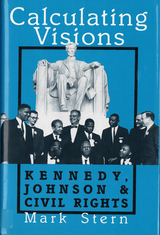
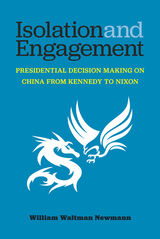
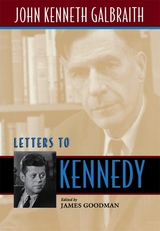
A unique document in the history of the Kennedy years, these letters give us a firsthand look at the working relationship between a president and one of his close advisers, John Kenneth Galbraith. In an early letter, Galbraith mentions his "ambition to be the most reticent adviser in modern political history." But as a respected intellectual and author of the celebrated The Affluent Society, he was not to be positioned so lightly, and his letters are replete with valuable advice about economics, public policy, and the federal bureaucracy. As the United States' ambassador to India from 1961 to 1963, Galbraith made use of his position to counsel the President on foreign policy, especially as it bore on the Asian subcontinent and, ultimately, Vietnam.
Written with verve and wit, his letters were relished by a president who had little patience for foolish ideas or bad prose. They stand out today as a vibrant chronicle of some of the most subtle and critical moments in the days of the Kennedy administration--and a fascinating record of the counsel that Galbraith offered President Kennedy. Ranging from a pithy commentary on Kennedy's speech accepting the 1960 Democratic presidential nomination (and inaugurating the "New Frontier") to reflections on critical matters of state such as the Cuban Missile Crisis and the threat of Communism in Indochina, Letters to Kennedypresents a rare, intimate picture of the lives and minds of a political intellectual and an intellectual politician during a particularly bright moment in American history.
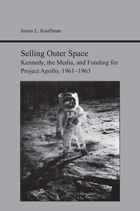
Examines the Kennedy administration’s rhetorical campaign to persuade Congress and the public to adopt a manned flight to the moon. In so doing, the study addresses three key themes.
First, it illuminates the contrasting nature of technical and narrative arguments and explores how those arguments play different roles in public discussion of social policy. Second, the book examines how both the executive branch and the news media function to help set the agenda in American politics. Offering a case study of the increasingly complex relationship between the government and the media.
Finally, Selling Outer Space explores the power of technology to shape and direct human action.
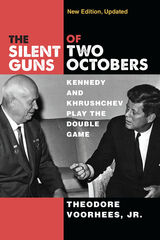
The Silent Guns of Two Octobers uses new as well as previously under-appreciated documentary evidence to link the Cuban Missile Crisis to the Checkpoint Charlie tank standoff to achieve the impossible—craft a new, thoughtful, original analysis of a political showdown everyone thought they knew everything about. Ultimately the book concludes that much of the Cold War rhetoric the leaders employed was mere posturing; in reality neither had any intention of starting a nuclear war. Theodore Voorhees reexamines Khrushchev’s and Kennedy’s leadership, decision, and rhetoric in light of the new documentary evidence available. Voorhees examines the impact of John F. Kennedy's domestic political concerns about his upcoming first midterm elections on his handling of the Cuban Missile Crisis through his use of back-channel dealings with Khrushchev during the lead-up to the crisis and in the closing days when the two leaders managed to reach a settlement.
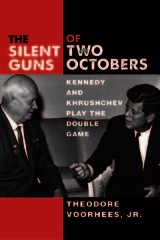
The Silent Guns of Two Octobers uses new as well as previously under-appreciated documentary evidence to link the Cuban Missile Crisis to the Checkpoint Charlie tank standoff to achieve the impossible—craft a new, thoughtful, original analysis of a political showdown everyone thought they knew everything about. Ultimately the book concludes that much of the Cold War rhetoric the leaders employed was mere posturing; in reality neither had any intention of starting a nuclear war. Theodore Voorhees reexamines Khrushchev’s and Kennedy’s leadership, decision, and rhetoric in light of the new documentary evidence available. Voorhees examines the impact of John F. Kennedy's domestic political concerns about his upcoming first midterm elections on his handling of the Cuban Missile Crisis through his use of back-channel dealings with Khrushchev during the lead-up to the crisis and in the closing days when the two leaders managed to reach a settlement.

A sobering account of how the United States trapped itself in endless wars—abroad and at home—and what it might do to break free.
Over the past half-century, Americans have watched their country extend its military power to what seemed the very ends of the earth. America’s might is felt on nearly every continent—and even on its own streets. Decades ago, the Wars on Drugs and Terror broke down the walls separating law enforcement from military operations. A World of Enemies tells the story of how an America plagued by fears of waning power and influence embraced foreign and domestic forever wars.
Osamah Khalil argues that the militarization of US domestic and foreign affairs was the product of America’s failure in Vietnam. Unsettled by their inability to prevail in Southeast Asia, US leaders increasingly came to see a host of problems as immune to political solutions. Rather, crime, drugs, and terrorism were enemies spawned in “badlands”—whether the Middle East or stateside inner cities. Characterized as sites of endemic violence, badlands lay beyond the pale of civilization, their ostensibly racially and culturally alien inhabitants best handled by force.
Yet militarized policy has brought few victories. Its failures—in Iraq, Afghanistan, US cities, and increasingly rural and borderland America—have only served to reinforce fears of weakness. It is time, Khalil argues, for a new approach. Instead of managing never-ending conflicts, we need to reinvest in the tools of traditional politics and diplomacy.
READERS
Browse our collection.
PUBLISHERS
See BiblioVault's publisher services.
STUDENT SERVICES
Files for college accessibility offices.
UChicago Accessibility Resources
home | accessibility | search | about | contact us
BiblioVault ® 2001 - 2025
The University of Chicago Press


